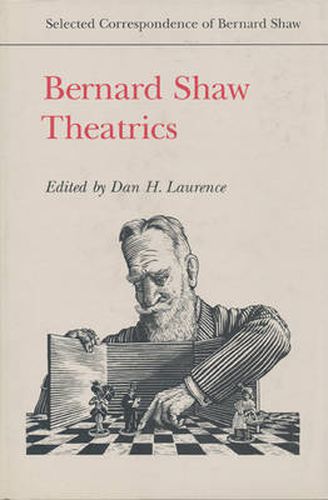Readings Newsletter
Become a Readings Member to make your shopping experience even easier.
Sign in or sign up for free!
You’re not far away from qualifying for FREE standard shipping within Australia
You’ve qualified for FREE standard shipping within Australia
The cart is loading…






In his introduction Dan H. Laurence notes that ‘theatrics’ connotes not only activities of a theatrical character but behaviour that manifests itself as theatricality. All the correspondence selected for this volume - most of it hitherto unpublished - relates to Bernard Shaw’s theatre dealings and theatrical interest, at the same time attesting to the ‘histrionic instinct’ and ‘theatrified imagination’ (his own phrases) of the man who penned them.
More than one hundred letters are represented, starting from mid-1889, when Shaw had not yet completed his first play and was known instead as a music critic, journalist, socialist organizer, and street orator. The letters reveal a consummate man of the theatre: a dramatist, director, actor, designer, publicist, financial backer, translator, and critic concerned with such varied issues as censorship, theatre politics, prying journalists, and wireless and television performance. The letters are shaded with histrionic tones of assumed anger, irritation, and anguish. The style invariably is colloquial, free-flowing, ebullient - and personal.
$9.00 standard shipping within Australia
FREE standard shipping within Australia for orders over $100.00
Express & International shipping calculated at checkout
In his introduction Dan H. Laurence notes that ‘theatrics’ connotes not only activities of a theatrical character but behaviour that manifests itself as theatricality. All the correspondence selected for this volume - most of it hitherto unpublished - relates to Bernard Shaw’s theatre dealings and theatrical interest, at the same time attesting to the ‘histrionic instinct’ and ‘theatrified imagination’ (his own phrases) of the man who penned them.
More than one hundred letters are represented, starting from mid-1889, when Shaw had not yet completed his first play and was known instead as a music critic, journalist, socialist organizer, and street orator. The letters reveal a consummate man of the theatre: a dramatist, director, actor, designer, publicist, financial backer, translator, and critic concerned with such varied issues as censorship, theatre politics, prying journalists, and wireless and television performance. The letters are shaded with histrionic tones of assumed anger, irritation, and anguish. The style invariably is colloquial, free-flowing, ebullient - and personal.